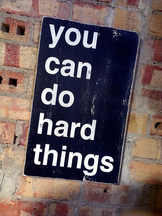ETEC 500 - Research Methodologies in Education
|
When deconstructing in order to renovate, you need to move a lot of stuff first. Clearing the room, stripping the walls, and taking it down to the studs. I began at the beginning by reading the textbook "Educational Research: Competencies for analysis and applications" by Gay, Mills and Airasian. This text provided insight into the impact of research to education, methodologies used, and issues and practice in educational research. I turned my focus to one of 'inquiry and wonder'. It stripped away my preconceptions and untenable perspectives. It exposed my biases and misunderstandings. I found myself wanting to become a better educator through application of research methodologies. My belief that I could do hard things became realized.
|
Immediate ValueA meaningful activity described and my experience of it.
|
A meaningful activity in ETEC 500 was the literature review and research proposal (LINKED HERE). It explored the use of electronic portfolios in faculties of education to increase student reflection within communities of practice. I examined the application of Wenger & DeLaat’s value creation story framework to this context.
Researching is a process of stripping away irrelevant information, digging deeply into a subject topic and finding the question that has not been asked before. It is done so others can learn from the story that is uncovered. |
Potential ValueSpecific resource from this activity and why it is useful
|
The focus of my research proposal could be applied to the current context in which I work since there is currently no formal application of digital portfolios. I wanted to discover more about portfolios as a mechanism for developing a community of practice, student engagement and reflection within a faculty of education.
Through my work on the literature review and research proposal, I frequently questioned my abilities, skills, and perspectives. The process of deconstructing a topic and finding an essential question was as hard as clearing a room for renovation - lots of chaos and you can’t see the potential until you get the mess cleared away. |
Applied ValueHow I used this resource in my practice and what it has enabled.
|
This work created space for reflection of my own teaching practice and my reflections within a community of practice (Faculty advisors). It helped shape my own thinking about what we do and why we do it – teaching techniques, authentic assignments, and meaningful engagement. Through this process, I have modeled for my colleagues and our students how reflective practice shapes teaching.
Acquiring the skills and perspectives of an educational researcher changed my view of who I am as an educator. I teach, therefore I am a teacher. Somewhere within the mess and chaos of ETEC 500 I was renovated into a researcher. I teach, therefore I am a researcher. I explore, explain, analyze and investigate what works, why it works, how it works and with whom it works. My world-view now reflects this new perspective and shapes my own instruction and reflection. |
Realized ValuePersonal and organizational affect and success resulting from the activity and artifacts.
|
My personal success was finding the focus for my research proposal and reflecting on what research means. ETEC 500 renovated my thinking about
· my own ability to do research, · the importance of using e-portfolios as a mechanism for deep reflection within a faculty of education as students transform into teachers •how to build communities of practice around artifacts about learning to teach In applying the skills of critical analysis, synthesis and reflection, I was able to clear away the clutter and find the framework underlying my research investigations. My reflections on lessons learned, after the dust settled from the deconstructions of ETEC 500, are found on this blog post. |
Reframing ValueNew definition of success
|
Success is reflection. It is thinking deeply about what you do, why you do it, how it impacts others, and is done within a supportive community of practice. Looking at your own actions and reactions through the lens of effective practice and meaningful research shapes this personal and professional success.
Success is getting published. Through the peer review process and critically analyzing research, becoming a published author of research would mean success. My vision of using e-portfolios within my current context is not yet realized, but has potential to become incorporated as a teaching and learning tool as I share my research story. Through my renovations in ETEC 500, my hope for success as a published researcher is closer to being realized. Prior to ETEC 500, this would not have been a goal or a vision for success. Now, it is within the realm of possibility, since I have a story to share. |
References and Research that supported 'my renovations'
Barab, S., & Duffy, T. (1998). From practice fields to communities of practice. In D. Jonassen & S. Land (Eds.), Theoretical Foundations of Learning Environments, Center for Research and Learning and Technology: Lawrence Erlbaum Associates, Inc., Bloomington, Indiana.
Gay, L., Mills, G., & Airasian, P. (2012) Educational research: Competencies for analysis and applications (10th Ed.). New York, NY: Pearson
Smith, M. K. (2001) 'Donald Schön: learning, reflection and change', the encyclopedia of informal education. Retrieved from www.infed.org/thinkers/et-schon.htm
Rodgers, C. (2002) Defining reflection: Another look at John Dewey and reflective thinking. Teachers College Record, 104(4), 842-866.
Wenger, E. (2012b) Communities of practice and social learning systems: The career of a concept. [web document]. Retrieved from http://wenger-trayner.com/wp-content/uploads/2012/01/09-10-27-CoPs-and-systems-v2.01.pdf
Gay, L., Mills, G., & Airasian, P. (2012) Educational research: Competencies for analysis and applications (10th Ed.). New York, NY: Pearson
Smith, M. K. (2001) 'Donald Schön: learning, reflection and change', the encyclopedia of informal education. Retrieved from www.infed.org/thinkers/et-schon.htm
Rodgers, C. (2002) Defining reflection: Another look at John Dewey and reflective thinking. Teachers College Record, 104(4), 842-866.
Wenger, E. (2012b) Communities of practice and social learning systems: The career of a concept. [web document]. Retrieved from http://wenger-trayner.com/wp-content/uploads/2012/01/09-10-27-CoPs-and-systems-v2.01.pdf





